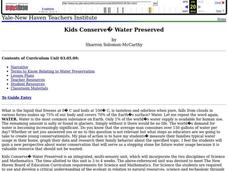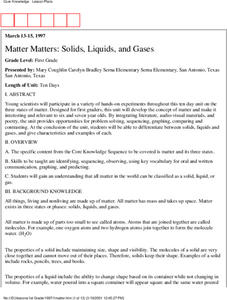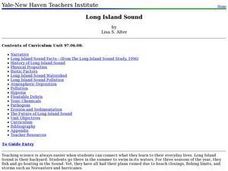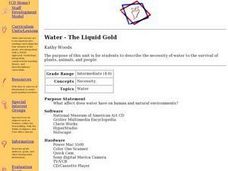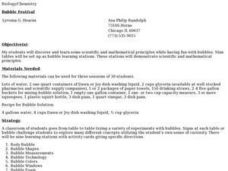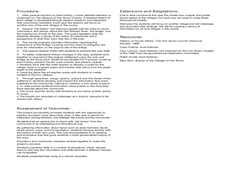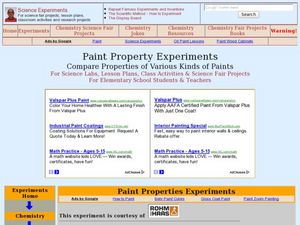Curated OER
How the Environment Affects Our Health
Ninth graders explore how the environment affects health. In this infectious disease lesson, 9th graders investigate what environmental situations cause infections diseases. Students study the symptoms, treatments, prevention, and...
Curated OER
For the Birds
Second graders explore biology by creating birdhouses. For this bird identification lesson, 2nd graders discuss the different types of birds that live in their environment and what characteristics each type of bird has. Students create a...
Curated OER
The Great MPA Debate
Students study the 'Marine Protected Areas' process. In this ocean lesson students work in groups, conduct research and present it to the class.
Curated OER
Kids Conserve? Water Preserved
Students study conservation and how cities obtain their water. In this water instructional activity students view a PowerPoint presentation and draw a picture of the water cycle.
Curated OER
Matter Matters: Solids, Liquids and Gases
Scientists participate in a variety of hands-on experiments in this ten-day unit on the three states of matter. Lessons incorporate literature, a-v materials, and poetry to help students differentiate between solids, liquids and gases.
Curated OER
DISCOUNT LENSES ( GELATIN WAVE GUIDES)
High schoolers study attributes associated with concept of fiber optics is done using a labmade fiber optic from clear molded gelatin. A variety of shapes can be cut and pieced together to form a conduit to transmit the laser beam by...
Curated OER
The Pickle "Dill"emma
High schoolers study a problem in their local farming community regarding a pickle factory, and the class is asked to help determine if the pickle factory is the source of a seed germination problem.
Curated OER
Long Island Sound
Students use the Internet to research the history of Long Island Sound. In groups, they identify the sources of point and nonpoint pollution and how humans are impacting the area. After watching a video, they discuss the role of...
Curated OER
Deforestation, Fragmentation, and the Edge Effect
Students participate in an activity to demonstrate how deforestation, fragmentation, and habitat edges may affect native animal populations. Students accomplish this by playing a game from a provided worksheet and completing a graphing...
Curated OER
Water-The Liquid Gold
Learners investigate the necessity of water for the survival of plants, animals, and people. They explore the affect that water has on human and natural environments through literature, field trips, and discussions.
Curated OER
Cherishing the Water of Life
Learners work in small groups to brainstorm a list of all creatures, plants, natural, and artificial processes that use or depend on fresh water. The class views an aquarium filled with water representing all the water in the world. The...
Curated OER
Ocean Currents and Sea Surface Temperature
Students use satellite data to explore sea surface temperature. They explore the relationship between the rotation of the Earth, the path of ocean current and air pressure centers. After studying maps of sea surface temperature and ocean...
Curated OER
The Universe
Students describe what scientists mean by an "expanding universe" in their own words. They explain how scientists comprehend the universie is expanding. Students comprehend the vast scale of the universe. They comprehend how theory...
Curated OER
How is a Star's Color Related to Its Temperature?
In this star color and temperature worksheet, students create a Hertzsprung-Russell diagram in order to determine how star brightness, color, temperature, and class are related. Once diagram is complete, they answer 6 short answer...
Curated OER
Urban Effects on Inshore Plankton
Students investigate the effects of urban pollution on plankton. In this plankton and pollution lesson plan, students use samples of plankton collected in urban areas to observe the effects of pollution on plankton samples. They...
Curated OER
Bubble Festival
Young scholars practice scientific inquiry while learning about bubbles. In this lesson about bubbles, students explore characteristics of bubbles. Young scholars move through nine different "bubble" stations following directions and...
Curated OER
A Shredding We Will Go
Students take charge of a recycling project . In this environmental issues lesson, students manage a paper recycling project and use compost made from the recycled paper to beautify trees.
Curated OER
Shake, Rattle, and Roll: Mt. St. Helens - Lesson Plan 2
Students compile information on volcanic activity at Mount St. Helens. In this earth science instructional activity, students use the information they gathered on Mount St. Helens to answer questions and create charts in Excel. Then...
Curated OER
Ice Cream Toppings
Students explore the five senses. In this senses lesson, students use their senses to top their ice cream. Students compare and contrast the different toppings and write their observations, using descriptive words, in a notebook.
Curated OER
Sense of Place: No River Too Wide-Bridges
Fifth graders discover the history of their hometown Des Moines River. In this U.S. Geography lesson students speak with Iowans that tell stories of the settlers and early villages near the Des Moines River. Students document their...
Curated OER
What Influences Reaction Rate?
Learners study reaction rates, what determines how fast a reaction happens and how the chemical changes occur. In this reactions lesson students complete a lab where they use Alka-Seltzer to observe reaction rate and create a graph with...
Curated OER
Paint Property Experiments
Students identify various kinds of paints by using the scientific method. In this solvents lesson students collect data and identify paint samples while working in teams.
Curated OER
Does Global Warming Increase the Intensity of Atmospheric Natural Disasters?
Students study global warming by communicating the problem, process and solutions. In this global lesson students use graphs, research and write a critical stance on natural disasters.
Curated OER
Periodic Motion - The Pendulum
Students study the concept of periodic motion and relate it to the movement of a pendulum. They discover that the period of a pendulum is dependent on the length of the pendulum and independent of the bob and the amplitude.





